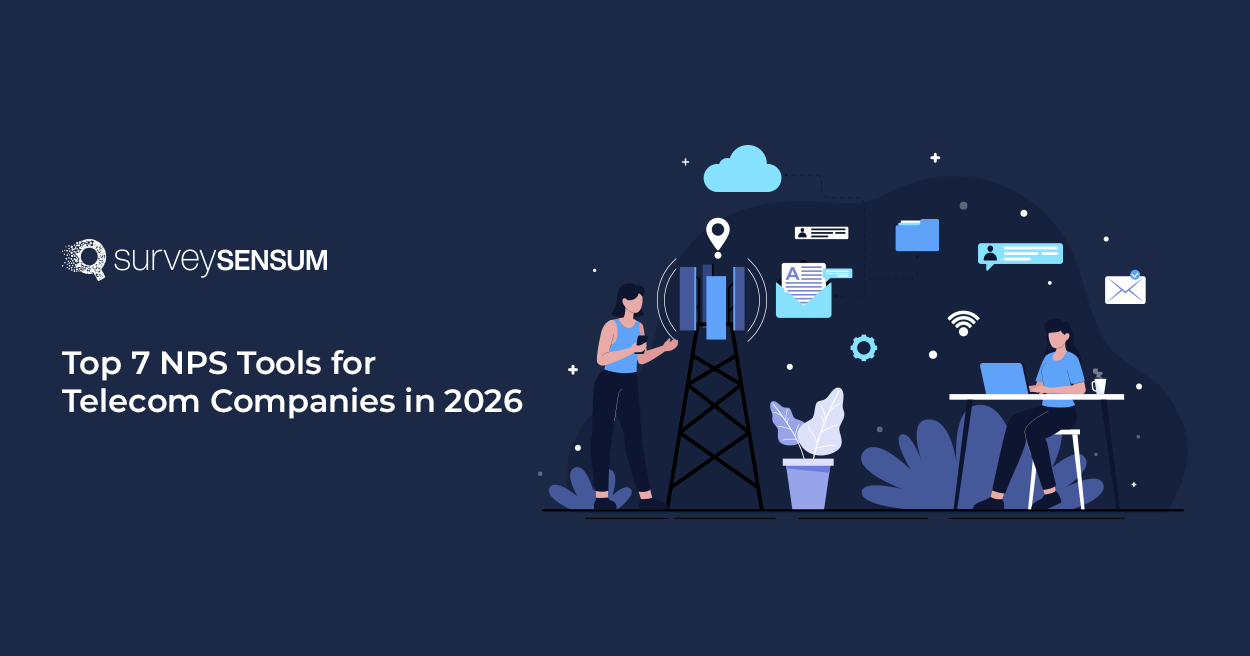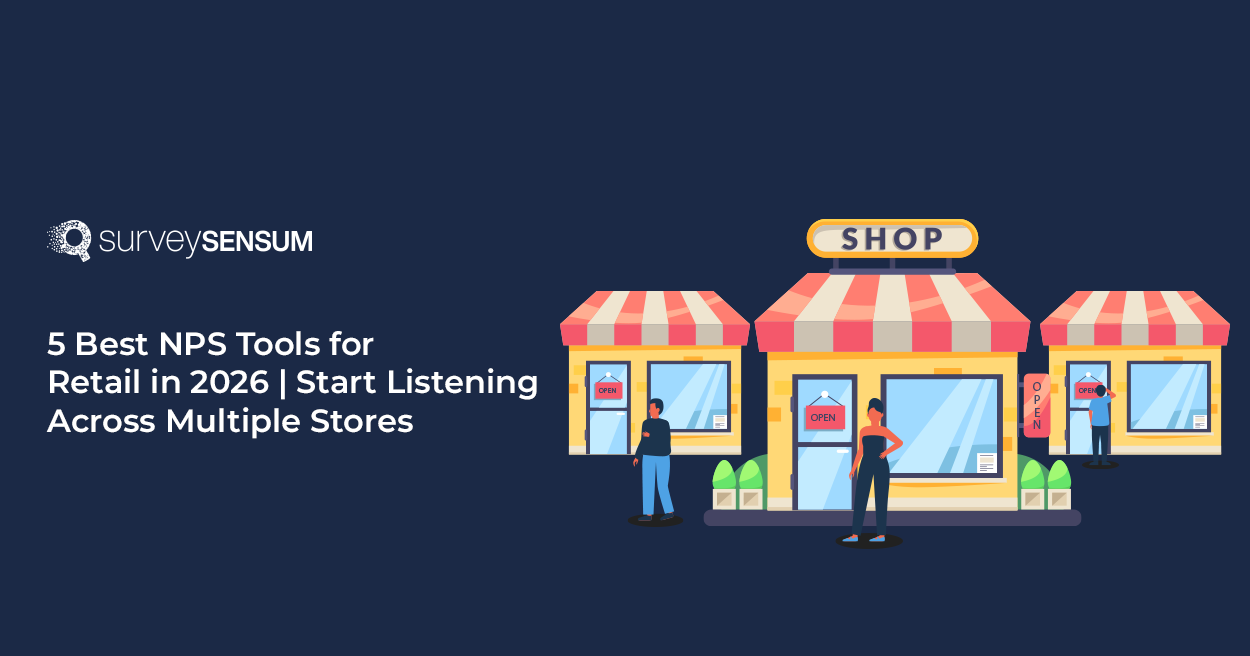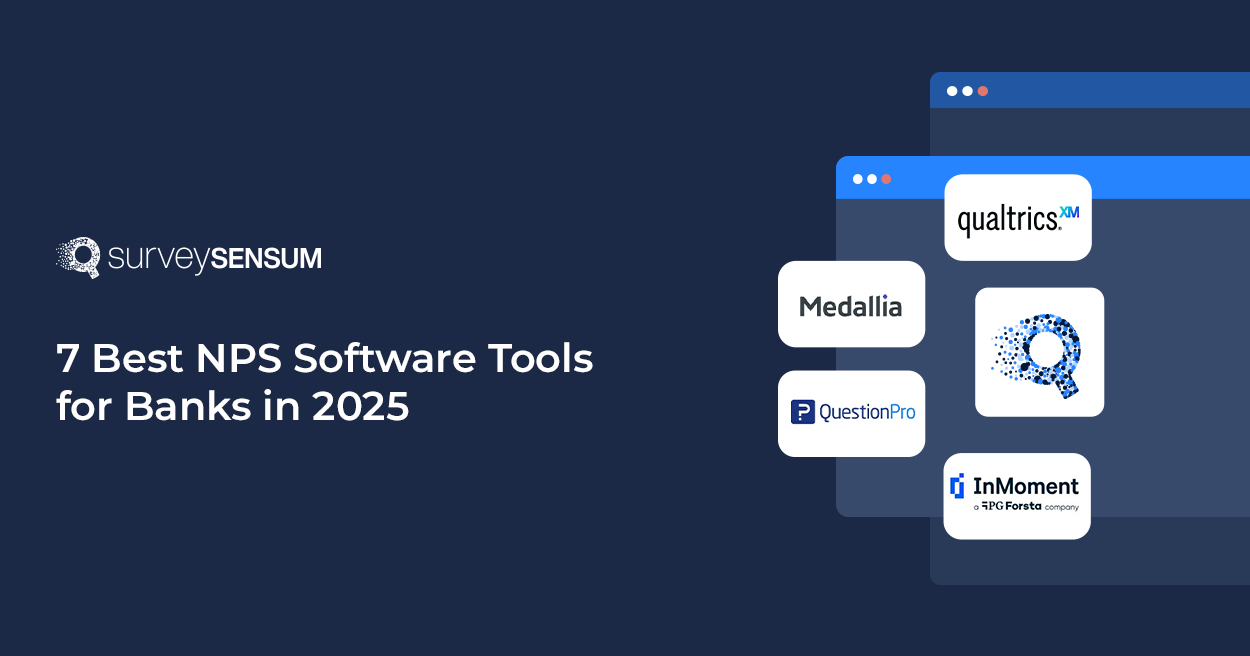

Telecom companies deal with one of the toughest customer experience challenges in the world – millions of customers, multiple product lines, fragmented channels, and constant service interruptions.
Network outages, billing confusion, long service queues, and poor response times can destroy loyalty overnight. That’s why measuring customer satisfaction and acting on it in real time isn’t optional anymore – it’s survival.
The right NPS (Net Promoter Score) software for telecom can turn customer feedback into instant, actionable insights, helping you identify network issues, reduce churn, and improve satisfaction faster.
Before we get into the tools – here is your buyer’s checklist followed by a quick comparison and deep-dive on the best NPS tools for telecom in 2025, with a sharp focus on AI features, closed-loop action, cross-tab insights, and real-time alerts.
What to Look For in an NPS Tool (Before You Buy)
Selecting the right NPS software for telecom isn’t about pretty dashboards – it’s about speed, automation, and scalability.
Your customer base is massive, your feedback volume is high, and your ability to act fast determines retention.
Here are the seven essential features every telecom company should look for before investing in an NPS platform:
1. Closed-Loop Ticketing System
Feedback should automatically convert into actionable tickets, routed to the right team – network, billing, or support – and tracked until closure.
This ensures no detractor is left unresolved and every issue has clear accountability.
2. AI-Powered Conversation Analytics
AI should instantly tag thousands of open-ended comments into telecom-specific themes like network, recharge, price, and agent behavior, detect sentiment, and surface top trends.
That turns days of manual analysis into minutes.
3. Role-Based Real-Time Dashboards
Dashboards must show what’s relevant for each role – CX heads see performance by circle or segment, while network or care teams see operational issues in real time.
Live data eliminates dependence on Excel reports.
4. Cross-Tab Analysis & Alerts
The platform should let you slice feedback dynamically by region, plan, customer type, or touchpoint – and send instant alerts when NPS drops in any circle or product.
No waiting for monthly reviews.
5. Multi-Channel Distribution (WhatsApp, SMS, App, Web)
Meet customers where they are.
WhatsApp, SMS, and in-app surveys typically achieve 5–10× higher response rates than email.
Your NPS tool should support every key channel natively.
6. Automated Survey Triggers
Surveys should auto-launch after key customer actions – SIM activation, recharge, plan change, complaint resolution, or service termination – ensuring contextual, timely feedback.
7. AI Copilot for CX Insights
Choose a platform with an AI Copilot – a virtual CX assistant that summarizes insights, identifies root causes, and suggests next steps automatically.
It saves analysts hours, turns feedback into strategy, and keeps your teams focused on action.
Quick Comparison: Best NPS Tools for Telecom
|
NPS Tool |
Best For |
Key Telecom Features |
AI Capabilities |
|
Real-time telecom CX & automation |
Multi-channel feedback, closed-loop workflows, TA, alerts |
SensAI Copilot, sentiment & churn detection |
|
|
Qualtrics XM |
Global multi-market enterprises |
Centralized NPS + local flexibility |
Predictive churn modeling, AI text IQ |
|
Medallia |
Omnichannel experience programs |
Contact center, retail, app integration |
Emotion detection, intent analytics |
|
NICE Satmetrix |
Agent & regional NPS visibility |
Post-call surveys, ticket alerts |
AI driver correlation |
|
SurveyMonkey CX |
Quick & affordable telecom NPS |
Lightweight setup, QR surveys |
AI summaries & trend detection |
|
SentiSum |
Deep text & ticket analysis |
Complaint classification, tagging |
AI-powered root cause detection |
|
InMoment |
Voice-of-Customer at scale |
Journey mapping, multi-source feedback |
NLP for emotion/intent, impact modeling |
Here’s a detailed look at the best NPS tools for telecom companies in 2025, their AI features, and how they solve the industry’s biggest CX challenges.
Top NPS Tools for Telecom (In Detail)
1. SurveySensum – Best for Real-Time Telecom NPS and AI Text Analytics
SurveySensum automates the entire telecom feedback cycle – from survey to insight to action – across millions of customers.
It supports Relationship NPS (rNPS) and Transactional NPS (tNPS) for every telecom journey – SIM activation, bill payment, plan change, service support, and more.
Why It’s Ideal for Telecom
- Closed-loop ticketing system: Automatically routes detractor issues to the right circle or network team.
- AI-powered Conversation Analytics: Auto-tags feedback into telecom-specific themes like network, pricing, or service.
- Cross-tab and alerts: Filter data by region, product, or issue, with alerts when scores dip.
- Real-time dashboards: No Excel, no manual pivot tables – data updates instantly.
- SensAI Copilot: Detects churn risk, summarizes trends, and suggests next steps automatically.
Best for: Operators seeking speed, automation, and real-time visibility across channels.
From SIM activations to support tickets – discover how your teams can close the feedback loop 10× faster.
2. Qualtrics XM – Best for Enterprise-Scale Telecom Operations
For large telecom enterprises spread across multiple regions, Qualtrics XM offers unmatched scalability and control.
Why telecoms choose it:
- Central control of NPS; localized content and triggers.
- Predict IQ to forecast churn using behavioral + sentiment signals.
- Deep CRM/Care/BI integrations.
- Text iQ for multi-language sentiment, intent, and emotion analysis.
AI advantage: Predicts churn and identifies root causes from historical feedback patterns.
Best for: Multi-country or multi-brand telecom providers.
3. Medallia – Best for Omnichannel Telecom Experience
Medallia unifies customer feedback across physical and digital channels – perfect for telecoms with complex ecosystems.
Why telecoms use it:
- Pulls signals from every touchpoint and journey.
- Closed-loop routing to accountable teams with SLAs.
- Contact-center integrations for agent-level coaching.
- NLU-driven emotion and intent analytics.
AI advantage: Uses NLU (Natural Language Understanding) to detect emotions and intent in customer comments.
Best for: Telecoms that want a single CX view across all customer touchpoints.
4. NICE Satmetrix – Best for Agent & Circle-Level NPS
NICE Satmetrix focuses on operational-level experience – making it ideal for telecoms managing large support teams and regional centers.
Why it fits telecoms:
- Post-call and post-interaction surveys at agent/queue level.
- Real-time dashboards by circle, team, store.
- SLA alerts for sudden NPS drops locally.
- AI driver analysis linking NPS with AHT, FCR, and handle quality.
AI advantage: Links operational data with NPS trends to pinpoint performance drivers.
Best for: Telecoms focusing on improving call center or agent-level performance.
5. SurveyMonkey CX – Best for Quick, Lightweight Telecom Programs
When you need a fast, easy-to-launch NPS program without enterprise complexity, SurveyMonkey CX delivers.
Why it works for telecom:
- Simple setup for post-interaction or plan feedback.
- Ideal for branch/store experience programs.
- Email/SMS/QR distribution.
- AI summaries highlight top trends quickly.
AI advantage: AI-powered insights that surface recurring issues automatically.
Best for: Regional telecoms or smaller divisions within larger providers.
6. SentiSum – Best for AI-Driven Text & Ticket Analysis
SentiSum focuses on making sense of massive volumes of customer feedback and support tickets.
Why telecoms love it:
- AI categorizes open-text comments into telecom-specific themes (network, recharge, agent).
- Identifies root causes across tickets and NPS feedback in real time.
- Prioritizes complaints by sentiment and frequency to guide operations.
AI advantage: Built specifically for large-volume service industries like telecom and airlines.
Best for: Telecoms that already collect feedback but struggle with analysis.
7. InMoment – Best for Multi-Source VoC with Strong NLP
InMoment blends survey, conversational, and operational data to map the full customer journey.
Why it’s ideal for telecom
- Journey analytics across onboarding, billing, care, and network.
- Pulls signals from surveys, reviews, and contact-center transcripts.
- Integrates with care and BI stacks for decisioning.
AI advantage: NLP for emotion/intent + impact modeling to show which fixes move NPS.
Best for: Operators unifying VoC across multiple data sources with analytics depth.
Why AI-Driven NPS Tools Matter Most in Telecom
Telecom feedback isn’t just about scores – it’s about scale, speed, and sentiment. You’re handling thousands (sometimes millions) of daily interactions. Without automation, insights get buried.
AI changes that.
It reads every comment, groups issues (network, billing, pricing, agent), detects emotion/urgency, and tells you where to act. With real-time dashboards, alerting, ticket routing, and predictive analytics, modern NPS tools make sure you act on feedback – not just report it.
Final Thoughts
In telecom, speed = retention. The best NPS tools combine automation, AI, and real-time action to help you close the loop, uncover root causes, and boost satisfaction at scale – whether you operate in APAC, MENA, North America, or Europe.
Choose a platform that matches your network’s complexity, geography (circles/regions), languages, and data stack.
Whether you need an enterprise suite like Qualtrics or Medallia, or an AI-first system like SurveySensum, the key is fit: channels, volumes, integrations, and time-to-insight.
Because in telecom, the faster you listen, the longer they stay.
Experience AI-powered NPS for Telecom with SurveySensum
FAQs on Top NPS Tools for Telecom
– Relationship NPS measures overall loyalty at defined intervals (e.g., Month 3, pre-renewal).
– Transactional NPS measures satisfaction after key events (SIM activation, recharge, plan change, ticket closure), pinpointing specific touchpoint issues.
WhatsApp, in-app, and SMS typically outperform email by 5–10× due to immediacy and lower friction.
AI auto-tags open-ended comments, detects emotion/urgency, correlates themes with NPS dips by circle/region, and recommends fixes – turning analysis hours into minutes.
Look for cross-tab without pivots, real-time alerts, closed-loop routing to the right ops team, and multi-language TA for regional nuance.
Set SLAs: detractors within 24 hours, passives within 48–72 hours. Tie tickets to owners and measure time-to-close.

















